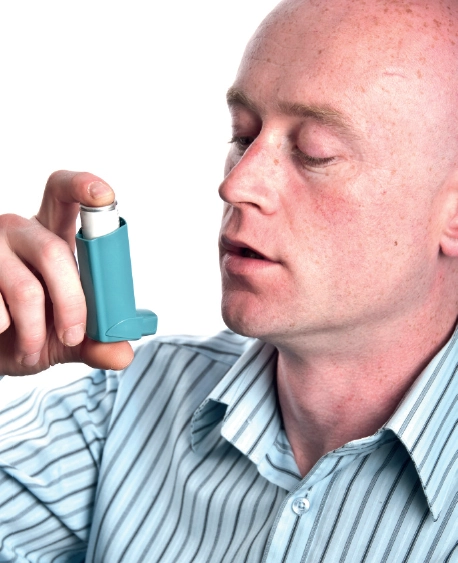
Upthebanner/Dreamstime.com
This content was published in 2011. We do not recommend that you take any clinical decisions based on this information without first ensuring you have checked the latest guidance.
It is a Saturday afternoon and a man comes into the pharmacy, wheezing slightly. He asks for a salbutamol inhaler. He tells you he has run out and explains that after using his blue inhaler his wheezing is usually relieved.
When faced with such a situation many pharmacists believe that the most appropriate action would be to give the man an inhaler to relieve his symptoms. But there are legalities to consider before handing one over.
Questions to ask
It is likely that when pharmacists encounter such situations they will be under pressure from the patient, as well as pressure to continue running the pharmacy safely, while trying to decide whether to supply. Describing the thought process in this case may help readers when they are next asked to make an emergency supply.
First, consider whether the legislation allows you to make a supply. This will involve interviewing the patient (see Panel 1) and, perhaps, making other checks.
PANEL 1: QUESTIONS TO ASK
- Is there an immediate need for the inhaler or can the patient see the doctor for a prescription?
- Has the inhaler been prescribed previously?
- Does the patient know the dose he needs to use?
During your conversation with the patient he tells you he is from Liechtenstein. The empty device is at his relative’s house, where he is currently staying. He usually takes two puffs when he starts wheezing.
Although the patient has not been prescribed the inhaler by a prescriber registered in the UK, you could still consider making this supply because the law allows you to make an emergency supply to a patient who has been prescribed the prescription-only medicine by a doctor or dentist registered in an EEA country (see Panel 2) or Switzerland.
PANEL 2: EEA COUNTRIES
Austria, Belgium, Bulgaria, Cyprus, Czech Republic, Denmark, Estonia, Finland, France, Germany, Greece, Hungary, Iceland, Ireland, Italy, Latvia, Liechtenstein, Lithuania, Luxembourg, Malta, Netherlands, Norway, Poland, Portugal, Romania, Spain, Slovak Republic, Slovenia, Sweden
In terms of immediate need, it might be useful to consider the following factors:
- The patient is slightly wheezing. By sending him to a doctor could you make his condition worse and cause him harm?
- Are the local GP surgeries open and, if so, will they register an overseas patient without undue delay?
- Is there a local out-of-hours service or accident and emergency department he can be referred to?
Are you satisfied the patient has used the inhaler before? You know the patient has not had the inhaler dispensed from your pharmacy previously and he does not have the empty inhaler with him. Yet he has explained that his wheezing is usually relieved by the inhaler. Is this enough to satisfy you that he has used the inhaler before? Do you believe he genuinely needs it and is not asking for the inhaler to abuse it? Abuse would include excessive use. In addition, there have been suggestions that salbutamol might be used in an attempt to improve performance in sport or to achieve weight loss.
Dilemma
If you are satisfied it is appropriate to make the supply you could make an emergency supply. However, situations are not always so straightforward. For example, if the man were from Canada, the legislation would not allow supply, even if you can tell that he is unwell and clearly needs the inhaler to relieve his symptoms. Having considered the legal requirements, you need to weigh this against what is the best action to take in the interest of patient care. After considering the man’s needs and his welfare, you may choose to make an emergency supply of the salbutamol inhaler even though you are aware it is illegal. Or you might feel supply is not appropriate because it is illegal and advise the man of other ways of obtaining a supply of the inhaler, such as seeing a doctor to obtain a prescription or medical care.
If appropriate (ie, depending on the urgency, etc) you may want to discuss your thoughts with a colleague or another pharmacist before making a decision. You could also contact your pharmacy superintendent, the Royal Pharmaceutical Society support team, the General Pharmaceutical Council or your professional indemnity insurance providers for advice. But the final decision will be yours. Whatever you decide to do in this scenario may be different from what another pharmacist may do.
It is important that you can justify why you have chosen the action you are taking. You need to be able to make an informed decision, based on experience and by exercising professional judgement. Bear in mind that there is no set right or wrong decision and each request should be handled on a case by case basis. It is advisable to record reasons for supplying outside the law.
Resources
Royal Pharmaceutical Society guidance on emergency supply, both at the request of a patient and at the request of a prescriber, and including information on record keeping and labelling, is available to RPS members at www.rpharms.com/law-and-ethics/emergency-supply.asp.
Support
Members can contact the Royal Pharmaceutical Society support team by telephone (0845 257 2570) or email (support@rpharms.com).

